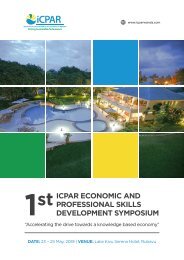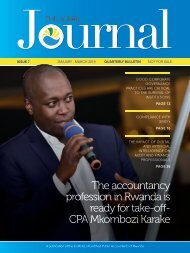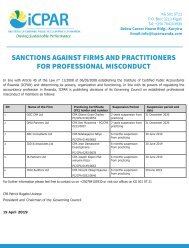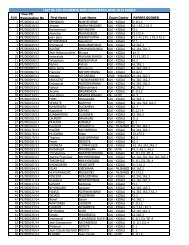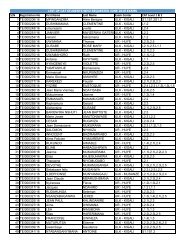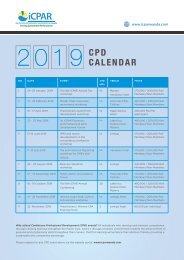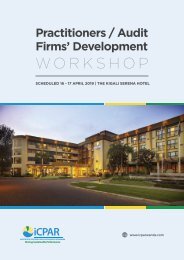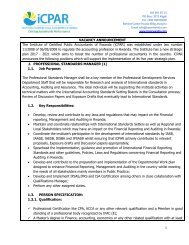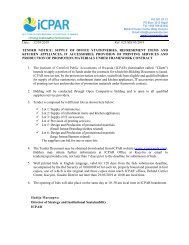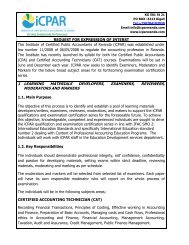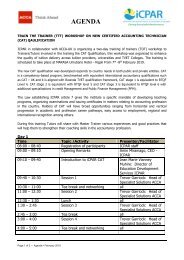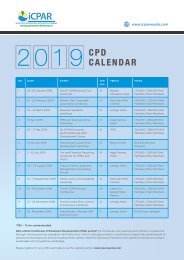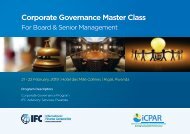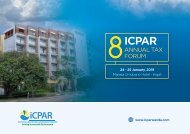iCPARQuarterlyBulletin-March2018
Create successful ePaper yourself
Turn your PDF publications into a flip-book with our unique Google optimized e-Paper software.
Journal<br />
The iCPAR<br />
ISSUE 3<br />
JANUARY - MARCH 2018<br />
iCPAR QUARTERLY BULLETIN<br />
NOT FOR SALE<br />
IFRS<br />
9<br />
IFRS 9 Financial Instruments,<br />
is likely to affect all sectors but mostly; banks<br />
A publication of the Institute of Certified Public Accountants of Rwanda
About us<br />
The Institute is the sole professional accountancy<br />
organization established by law No. 11/2008 of 6 th May<br />
2008 with a broad mandate to grow and regulate the<br />
accountancy profession<br />
What we do<br />
We regulate the accountancy profession; We preserve<br />
the integrity of the accounting profession; We promote<br />
the competence and the capacities of own members.<br />
We deliver accounting qualifications, programs<br />
and examinations.We promote compliance with<br />
professional standards<br />
Vision<br />
A strong, relevant and sustainable profession<br />
Mission<br />
To build a strong and engaged professional<br />
accountancy organization that anticipates stakeholder<br />
expectations and acts in the public interest<br />
Our Office<br />
KG 501 St 21, behind Career Center Building<br />
P.o.Box: 3213 Kigali Rwanda<br />
T: +250 784103930<br />
F: +250 280103930<br />
E: info@icparwanda.com
THE iCPAR JOURNAL<br />
3<br />
Inside this Issue<br />
13<br />
17 18<br />
4. Foreword<br />
5. Annual AGM notice<br />
7. The Commission for<br />
Inspection<br />
8. IFRS 9 Financial<br />
Instruments, is likely<br />
to affect all sectors but<br />
mostly; banks<br />
11. Release of December<br />
2017 examination results<br />
11. Updates on the<br />
upcoming new CAT<br />
qualification<br />
12. New CPD policy to be<br />
effective 1st July 2018<br />
13. KIM University; One of<br />
the tuition providers of<br />
CPA and CAT Rwanda<br />
16. If you want to be<br />
and remain relevant<br />
in the business and<br />
finance world, it is<br />
critical that you attain<br />
Professional Accounting<br />
Qualifications- Kajungu<br />
Clode<br />
18. Accountants in history<br />
19. List of accounting firms<br />
licenced by iCPAR as at<br />
31 January 2018<br />
21. 2018 CPD Calendar<br />
22. Humour, Crossword<br />
DISCLAIMER<br />
PUBLISHER<br />
Reproduction of any article in this journal<br />
without permission is prohibited. The editor<br />
reserves the right to use, edit or shorten<br />
articles for accuracy, space and relevance<br />
Copyright © iCPAR 2017. All rights reserved.<br />
Copyrights and all / or other intelectual property rights on<br />
all designs, graphics, logos, images, phots, texts, trade<br />
names, trademarks, etc in this publication are reserved.<br />
The reproduction, transmission or modification of any part<br />
of the contents of this publication is strictly prohibited.<br />
Our Office<br />
KG 501 St 21, behind Career Center Building<br />
P.o.Box: 3213 Kigali Rwanda<br />
T: +250 784103930<br />
F: +250 280103930<br />
E: info@icparwanda.com<br />
Disclaimer<br />
Views expressed in the journal are not necessarily those of the institute, management<br />
and employees.<br />
A publication of the Institute of Certified Public Accountants of Rwanda<br />
JANUARY - MARCH 2018
4 Journal<br />
The iCPAR<br />
Foreword<br />
Dear ICPAR Member,<br />
Happy new year once again!<br />
As per our commitment of ensuring that we regularly keep you<br />
abreast of the developments in the accountancy profession and<br />
beyond, here we are with the 3 rd issue.<br />
Firstly, I would like to thank all firms that managed to submit their<br />
Audit Quality Assurance (AQA) progress report which was purposely<br />
intended for monitoring the firm’s compliance with International<br />
Standards on Quality Control 1 (ISQC 1) relating to firm-wide audit<br />
quality control policies and procedures, and the IESBA Code of<br />
Ethics for Professional Accountants. Well done!<br />
It is important that we enhance the quality of reporting by ensuring<br />
that service providers in the accountancy profession adhere to all<br />
the relevant requirements. Similarly, professional accountants must<br />
constantly upgrade their skills; improve on the processes and work<br />
together effectively so that they continue to instill confidence and<br />
public trust.<br />
We believe our member firms will walk the talk by ensuring that what<br />
they submitted in the AQA progress report is actually implemented.<br />
This year, in collaboration with both the Inspection and Disciplinary<br />
Commissions, the institute will carry out a monitoring exercise<br />
towards ISQC 1 compliance. We request maximum collaboration<br />
with the team that will be carrying out that exercise.<br />
I would like to thank all firms<br />
that managed to submit their<br />
Audit Quality Assurance<br />
(AQA) progress report which<br />
was purposely intended for<br />
monitoring the firm’s compliance<br />
with International Standards<br />
on Quality Control 1 (ISQC 1)<br />
relating to firm-wide audit quality<br />
control policies and procedures,<br />
and the IESBA Code of Ethics for<br />
Professional Accountants. Well<br />
done!<br />
Amin Miramago<br />
iCPAR CEO | SG<br />
I would like to take this opportunity to remind our members that<br />
we shall have an ordinary meeting of general assembly in line<br />
with article 11 of law no. 11/2008 on Friday, 23 rd of March 2018.<br />
A notice of the same has also been issued and we expect all our<br />
members to attend. Please ensure that you are a member in good<br />
standing by fulfilling all the requirements prior to the meeting.<br />
Congratulations to all our students who passed their exams and<br />
to those who became iCPAR members this year. So sorry for those<br />
that never managed to pass their papers; and we believe next time<br />
they will, if they promptly follow guidance of their tuition providers<br />
whilst preparing themselves thoroughly in good time.<br />
Wishing you all the best for 2018 and looking forward to working<br />
more closely with you in the development of our profession and the<br />
nation at large.<br />
Amin Miramago<br />
Chief Executive Officer | Secretary General<br />
iCPAR QUATERLY BULLETIN<br />
JANUARY - MARCH 2018
THE iCPAR JOURNAL<br />
5<br />
Annual AGM notice<br />
NOTICE IS HEREBY GIVEN THAT THE 9 TH ANNUAL GENERAL MEETING (AGM) WILL BE HELD ON FRIDAY,<br />
23 RD MARCH 2018 FROM 3:00 PM AT SERENA HOTEL, KIGALI.<br />
Article 14: Without prejudice to the provisions of article 12 of this law, the meetings of the General Assembly<br />
shall be presided over by the President of the Governing Council of the Institute, who is also the President and Legal<br />
Representation of the Institute. In case of his or her absence, he or she shall be replaced by the Vice President.<br />
Agenda Item Facilitator Time Explanation<br />
1. ARRIVAL AND<br />
REGISTRATION<br />
2. QUORUM - To<br />
note if quorum is<br />
achieved. Quorum<br />
to be based on the<br />
members in good<br />
standing.<br />
3. WELCOME NOTE<br />
AND APOLOGIES<br />
4. MATTERS ARISING<br />
- from the AGM<br />
held on 24 th March<br />
2017<br />
5. GOVERNING<br />
COUNCIL REPORT<br />
To receive the<br />
President’s report<br />
6. ICPAR LOYALTY<br />
CARD presentation<br />
to members<br />
7. NEW CPD POLICY<br />
presentation to<br />
members<br />
iCPAR Secretariat 3:00 to 3:30 Receive members<br />
President 3:30 to 4:00 Article 13: The General Assembly<br />
shall be valid if attended by at<br />
least one half (1/2) of its members.<br />
If a quorum is not attained, the<br />
meeting of the General Assembly<br />
shall be adjourned to another day.<br />
During the next meeting, convened<br />
in ordinary way, the members<br />
present shall validly take decisions,<br />
irrespective of the quorum required.<br />
President 4:00 to 4:10 All members in attendance<br />
President 4:10 to 4:30 For information and follow up<br />
President 4:30 to 5:00 Article 20: The Governing Council<br />
shall prepare the Annual Activity<br />
Report for the previous year ended<br />
Dec, 2017.<br />
CEO|SG 5:00 to 5:10 For information<br />
President 5:10 to 5:30 For information<br />
A publication of the Institute of Certified Public Accountants of Rwanda<br />
JANUARY - MARCH 2018
6 Journal<br />
The iCPAR<br />
8. AUDITED<br />
FINANCIAL<br />
STATEMENTS:<br />
Auditor/CEO|SG 5:30 to 5:50 For adoption and approval<br />
a. To receive the<br />
Auditor’s report<br />
b. to adopt the<br />
audited financial<br />
statements<br />
9. APPOINTMENT OF<br />
AUDITORS:<br />
To appoint or<br />
reappoint institute’s<br />
auditors for the year<br />
2018<br />
President 5:50 to 5:55 Article 78: Any member of the<br />
Institute in public practice of<br />
accountancy, not being a member<br />
of the Governing Council of the<br />
Institute, may be elected the auditor<br />
of the Institute. The auditor is<br />
elected by simple majority of the<br />
members present at the annual<br />
general meeting for a renewable<br />
term of two (2) years.<br />
10. 2018 BUDGET President 5:55 to 6:15 Article 20: The GC shall prepare<br />
the draft budget of the Institute and<br />
submit it to the General Assembly<br />
for approval;<br />
11. DISCUSSION OF<br />
MEMBER ISSUES<br />
President 6:15 to 6:45 Contributions over the building<br />
fund;<br />
Implementation support for the<br />
AQA action plan<br />
12. A.O.B: To discuss<br />
any other business<br />
whose notice will<br />
have been received<br />
President 6:45 to 7:15 For information Purposes<br />
13. DINNER All 7:15 to 9:30 Enjoyment and Networking<br />
CPA Mkombozi Karake Bosco<br />
President of the Governing Council<br />
21 st February 2018<br />
iCPAR QUATERLY BULLETIN<br />
JANUARY - MARCH 2018
GET TO KNOW<br />
YOUR COMMISSIONS<br />
THE iCPAR JOURNAL<br />
7<br />
The Commission<br />
for Inspection<br />
CPA Felix Turatsinze<br />
Chairman<br />
CPA Boniface Mutua<br />
Secretary<br />
CPA Stephen Ineget<br />
Member<br />
The law, article 31 elaborates on the<br />
composition of the Commission. It<br />
states that the Commission shall be<br />
composed of 4 persons appointed as follows:<br />
I). Chairman of the Commission and two<br />
other members elected by the General<br />
Assembly of the Institute from among<br />
the Certified Public Accountants. And<br />
the Chairperson should not engage individually<br />
in the practice of accounting or<br />
auditing.<br />
II). The other person should be experienced<br />
in accounting and elected by a consortium<br />
of recognized universities and colleges<br />
offering courses leading to a qualification<br />
in accountancy. The members<br />
of the Commission shall elect a secretary<br />
from among themselves.<br />
The current chairperson is CPA Felix<br />
Turatsinze and the Commission secretary<br />
is Boniface Mutua, where the former is<br />
serving his first term while the later is in<br />
his second term.<br />
Article 32: Commissions roles<br />
and Responsibilities<br />
The Responsibilities of the Inspection Commission<br />
are as follows:<br />
• Monitor Compliance with the National<br />
Accounting Standards;<br />
• Monitor the conduct of firms exercising<br />
the accounting profession;<br />
• Provision of necessary recommendations<br />
to the Governing Council;<br />
• Advise on the draft national standards in<br />
preparation of financial statements, auditing<br />
and accounting in Rwanda to be<br />
published by a Ministerial order;<br />
• Recommend to the Governing Council<br />
of the Institute or the General Assembly<br />
to suspend or withdraw a member who<br />
is guilty of professional misconduct, the<br />
right to practice public accountancy;<br />
• Carry out any other necessary activity<br />
for the fulfilment of the institute’s responsibilities.<br />
The term of office for the<br />
members of the Commission is three<br />
(3) years renewable only once.<br />
While performing its duties, the commission<br />
is allowed to seek technical assistance<br />
from any person. They currently<br />
meet every Thursday of the third week of<br />
each Quarter i.e. January, April, July and<br />
October.<br />
The Commission for Inspection submit its<br />
reports to the governing Council of the Institute.<br />
Any inspected person who is not<br />
satisfied with the decision taken by the<br />
Governing Council, may appeal to the<br />
General assembly. This has to be done in<br />
writing.<br />
The Commission is entitled to perform<br />
general inspection of any firm and or<br />
member who has been given a license to<br />
practice as may be appropriate. To facilitate<br />
a smooth operation of this activity, the<br />
inspected person or his or her employees<br />
may be asked to provide explanations<br />
and present the accounting records or<br />
any other necessary documents and may<br />
photocopy them – this act is not treated<br />
as a breach of professional secrecy.<br />
Similarly, the Commission may be requested<br />
to perform a special inspection<br />
at such a time as may be appropriate or<br />
upon request by the Governing Council<br />
of the Institute.<br />
It is prohibited to the Commission for<br />
Inspection or its staff to disclose professional<br />
secrecy, unless it provided for by<br />
the law or required by a competent court.<br />
Any person who discloses professional<br />
secrecy shall be liable to sanctions in accordance<br />
with the code of professional<br />
conduct and ethics.<br />
The commission for inspection has contributed<br />
a lot towards getting the accountancy<br />
profession to the next level and<br />
it has promised to work hand in hand<br />
with the secretariat to ensure that ICPAR<br />
mandate is realized especially in regard<br />
to firm’s compliance with International<br />
standards on Quality Control 1 (ISQC 1)<br />
as we endeavor to obtain full IFAC membership<br />
soonest.<br />
A publication of the Institute of Certified Public Accountants of Rwanda<br />
JANUARY - MARCH 2018
8 Journal<br />
The iCPAR<br />
IFRS 9 Financial<br />
Instruments, is<br />
likely to affect<br />
all sectors but<br />
mostly; banks<br />
In July 2014, the International Accounting<br />
Standards Board (IASB)<br />
completed its response to the<br />
financial crisis by issuing the final<br />
version of IFRS 9, Financial Instruments.<br />
IFRS 9 sets out a model for<br />
classification and measurement,<br />
an ’expected loss’ impairment<br />
model and a transformed approach<br />
to hedge accounting.<br />
The IASB had previously issued<br />
versions of IFRS 9 that introduced<br />
new classification and measurement<br />
requirements in 2009 and<br />
2010 and a new hedge accounting<br />
model in 2013. The latest publication<br />
consolidates the previous versions<br />
of the standard, and replaces<br />
IAS 39, Financial Instruments: Recognition<br />
and Measurement. It also<br />
changes some of the requirements<br />
of the previous publications. IFRS<br />
9 is effective for annual periods beginning<br />
on or after 1 January 2018.<br />
Classification determines how financial<br />
assets and financial liabilities<br />
are accounted for and measured<br />
in financial statements. The<br />
requirements for impairment and<br />
hedge accounting are based upon<br />
the instruments classification.<br />
The standard introduces a principle-based<br />
system for the classification<br />
and measurement of financial<br />
assets, which depends upon two<br />
characteristics: The entity’s business<br />
model for managing the financial<br />
asset and the financial asset’s<br />
contractual cash flow characteristics.<br />
IFRS 9 utilises a single classification<br />
approach for all types of<br />
financial assets, which includes<br />
those that contain embedded derivative<br />
features. Financial assets<br />
are now not subject to complicated<br />
bifurcation requirements.<br />
The business model approach refers<br />
to how an entity manages its<br />
financial assets in order to generate<br />
cash flows either by collecting<br />
contractual cash flows, selling<br />
financial assets or both. Financial<br />
assets are measured at amortised<br />
cost where the business model’s<br />
objective is to hold assets in order<br />
to collect contractual cash flows.<br />
The new standard clarifies the existing<br />
guidance the collection of<br />
the assets’ contractual cash flows.<br />
When determining the applicability<br />
of this business model, an entity<br />
should consider past and future<br />
sales information. If an entity holds<br />
financial assets for sale then it will<br />
fail the business model test for accounting<br />
for the financial assets<br />
at amortised cost. However, sales<br />
activity is not necessarily inconsistent<br />
with the business model if they<br />
are infrequent and insignificant in<br />
value but where these sales are<br />
frequent and significant in value,<br />
an entity needs to assess whether<br />
such sales are consistent with an<br />
objective of collecting contractual<br />
cash flows.<br />
The sales may be consistent with<br />
that objective if they ‘are made<br />
close to the maturity of the financial<br />
assets and the proceeds from<br />
the sales approximate the collection<br />
of the remaining contractual<br />
cash flows’. For many entities,<br />
the assessment will be relatively<br />
straightforward as their financial<br />
assets may be simply trade receivables<br />
and bank deposits for which<br />
the amortised cost criteria are likely<br />
to be met. For those entities with<br />
a broader range of financial assets<br />
such as investors in debt securities,<br />
and insurance companies, the motivations<br />
behind the disposal of the<br />
assets will have to be considered.<br />
NEW MEASUREMENT<br />
CATEGORY<br />
IFRS 9 includes a new measurement<br />
category whereby financial<br />
assets are measured at Fair Value<br />
Through Other Comprehensive<br />
Income (FVTOCI). This category is<br />
used when financial assets are held<br />
in a business model whose objective<br />
is both collecting contractual<br />
cash flows and selling financial assets.<br />
Unlike the available-for-sale<br />
criteria in IAS 39, the criteria<br />
for measuring at FVTO-<br />
CI are based on the<br />
iCPAR QUATERLY BULLETIN<br />
JANUARY - MARCH 2018
THE iCPAR JOURNAL<br />
9<br />
financial asset’s cash flow characteristics<br />
and the entity’s business<br />
model. This business model will<br />
involve a greater frequency and<br />
volume of sales with the possible<br />
objectives of managing liquidity<br />
or matching the duration of financial<br />
liabilities to the duration of the<br />
assets they are funding. This category<br />
was introduced because of<br />
the concerns raised by preparers<br />
who sold financial assets in greater<br />
volume than was consistent with<br />
the previous business model and<br />
would, without this category, have<br />
to record such assets at Fair Value<br />
Through Profit or Loss (FVTPL).<br />
Financial assets may qualify for<br />
amortised cost or FVOCI only if<br />
they give rise to ‘Solely Payments<br />
of Principal and<br />
Interest’<br />
(SPPI) under the contractual cash<br />
flows characteristics test. Many<br />
instruments have features that are<br />
not in line with the SPPI condition.<br />
IFRS 9 makes it clear that such features<br />
are disregarded if they are<br />
‘non-genuine’ or ‘de minimis’.<br />
IFRS 9 now provides more guidance<br />
on SPPI. For contractual cash<br />
flows to be SPPI, they must include<br />
returns that are consistent with the<br />
return on a basic lending arrangement<br />
to the holder, which generally<br />
includes consideration for the<br />
time value of money, credit risk,<br />
liquidity risk, a profit margin and<br />
consideration for costs associated<br />
with holding the financial asset<br />
over time such as servicing costs.<br />
Thus if the contractual<br />
arrange-<br />
ment includes a return for equity<br />
price risk, then this would be inconsistent<br />
with SPPI.<br />
IFRS 9 introduces new guidance<br />
on how the contractual cash flows<br />
characteristics assessment applies<br />
to debt instruments that may<br />
contain a modified time value element.<br />
For example, those instruments<br />
that may contain a variable<br />
interest rate. These characteristics<br />
will result in an instrument failing<br />
the contractual cash flow characteristics<br />
test if the resulting undiscounted<br />
contractual cash flows<br />
could be ‘significantly different’<br />
from the undiscounted cash flows<br />
of a benchmark instrument that<br />
does not have such features.<br />
Interest rates set by a government<br />
or a regulatory authority are accepted<br />
as a proxy for the consideration<br />
for the time value of money<br />
if those rates provide consideration<br />
that is ‘broadly consistent with<br />
consideration for the passage<br />
of time’. Such cash flows are<br />
considered SPPI as long as<br />
they do not introduce risk<br />
or volatility, which is inconsistent<br />
with a basic<br />
lending arrangement.<br />
Any financial assets<br />
that are not held in<br />
one of the two business<br />
models above are<br />
measured at FVTPL,<br />
which is essentially a<br />
residual category. Also<br />
included in this category<br />
are financial assets that are<br />
held for trading and those<br />
managed on a fair value basis.<br />
Financial assets are reclassified<br />
when, the entity’s business model<br />
for managing them changes. This<br />
is not expected to occur frequently<br />
A publication of the Institute of Certified Public Accountants of Rwanda<br />
JANUARY - MARCH 2018
10 Journal<br />
The iCPAR<br />
and it ensures that users of financial<br />
statements are provided with<br />
information on the realisation of<br />
cash flows.<br />
IAS 39 was felt to work well as<br />
regards the accounting for financial<br />
liabilities, therefore the IASB<br />
felt that there was little need for<br />
change. Thus, most financial liabilities<br />
will continue to be measured<br />
at amortised cost. IAS 39 also permitted<br />
entities to elect to measure<br />
financial liabilities at fair value<br />
through profit or loss (fair value<br />
option). The changes introduced<br />
by IFRS 9 are restricted to those liabilities<br />
designated at FVPL using<br />
the fair value option. Fair value<br />
changes of these financial liabilities<br />
are presented in other comprehensive<br />
income to the extent that<br />
they are attributable to the change<br />
in the entity’s own credit risk. If<br />
this would cause an accounting<br />
mismatch, then the total fair value<br />
change is presented in profit<br />
or loss. This change in IFRS 9 is<br />
designed to eliminate volatility in<br />
profit or loss caused by changes in<br />
the credit risk of financial liabilities<br />
that an entity has elected to measure<br />
at fair value.<br />
NEW IMPAIRMENT MODEL<br />
IFRS 9 introduces a new impairment<br />
model for financial assets<br />
that is based on expected losses<br />
rather than incurred losses. It applies<br />
to amortised-cost financial<br />
assets and those categorised as<br />
FVTOCI.It also applies to certain<br />
loan commitments, financial guarantees,<br />
lease receivables, and contract<br />
assets. An entity recognises<br />
expected credit losses at all times<br />
and updates the assessment at<br />
each reporting date to reflect any<br />
changes in the credit risk. It is no<br />
longer necessary for there to be a<br />
trigger event for credit losses to be<br />
recognized and the same impairment<br />
model is used for all financial<br />
instruments that are impairment<br />
tested.<br />
Other than purchased or originated<br />
credit-impaired financial assets,<br />
IFRS 9 requires entities to measure<br />
expected credit losses by recognising<br />
a loss allowance equal to either<br />
of the following:<br />
• 12-month expected credit losses.<br />
This measurement is required if<br />
the credit risk is low at the reporting<br />
date or the credit risk has not<br />
increased significantly since initial<br />
recognition.<br />
• Full lifetime expected credit losses.<br />
This measurement is required<br />
If the credit risk has increased significantly<br />
since recognition and the<br />
resulting credit quality is not considered<br />
to be low credit risk. Entities<br />
can elect for an accounting policy<br />
of always recognising full lifetime<br />
expected losses for contract assets,<br />
trade receivables, and lease receivables.<br />
When measuring expected<br />
credit losses, an entity should consider<br />
the probability-weighted outcome,<br />
the time value of money and<br />
information that is available without<br />
undue cost or effort.<br />
IFRS 9 introduces a reformed<br />
model for hedge accounting with<br />
enhanced disclosures about risk<br />
management activity. Under IFRS<br />
9, a hedging relationship qualifies<br />
for hedge accounting only if all of<br />
the following criteria are met:<br />
• The hedging relationship consists<br />
only of eligible hedging instruments<br />
and eligible hedged items.<br />
• At the inception of the hedging<br />
relationship there is formal designation<br />
and documentation of the<br />
hedging relationship and the entity’s<br />
risk management objective<br />
and strategy for undertaking the<br />
hedge.<br />
IFRS 9 includes a new<br />
measurement category<br />
whereby financial assets are<br />
measured at Fair Value Through<br />
Other Comprehensive Income<br />
(FVTOCI). This category is used<br />
when financial assets are held<br />
in a business model whose<br />
objective is both collecting<br />
contractual cash flows and<br />
selling financial assets.<br />
• The hedging relationship meets all<br />
of the hedge effectiveness requirements<br />
In order to qualify for hedge accounting,<br />
the hedge relationship<br />
must meet the effectiveness criteria<br />
at the beginning of each hedged<br />
period:<br />
• There is an economic relationship<br />
between the hedged item and the<br />
hedging instrument.<br />
• The effect of credit risk does not<br />
dominate the value changes that<br />
result from that economic relationship.<br />
• The hedge ratio of the hedging relationship<br />
is the same as that actually<br />
used in the economic hedge<br />
IFRS 9 will affect all sectors though<br />
the introduction of an expected<br />
loss model for loan loss provisioning,<br />
but will impact mostly on<br />
banks. IFRS 9 should give investors<br />
better insight into the credit quality<br />
of all financial assets. However,<br />
putting the new requirements into<br />
practice by the effective date will<br />
be quite a challenge.<br />
Source;<br />
First published by ACCA on 1 st February<br />
2018<br />
iCPAR QUATERLY BULLETIN<br />
JANUARY - MARCH 2018
THE iCPAR JOURNAL<br />
11<br />
Release of December<br />
2017 examination results<br />
iCPAR released the 11th professional<br />
examinations results<br />
of Certified Public Accountant<br />
(CPA) and Certified Accounting<br />
Technician (CAT) conducted in<br />
December 2017. The 11th iCPAR<br />
examination sitting was held from<br />
November 27th to December 1st<br />
2017 in two examination centers:<br />
Kigali Independent University and<br />
University of Rwanda, Huye campus.<br />
The total number of candidates<br />
who sat for professional exams in<br />
December 2017 was 1,357 subdivided<br />
into 925 candidates for CPA<br />
examinations and 432 candidates<br />
who sat for CAT examinations.<br />
The overall pass rates for CAT and<br />
CPA increased by 15% compared<br />
to June 2017 sitting. The pass rates<br />
were 57% CAT and 44% CPA in<br />
December, 2017 compared to<br />
38% CAT and 33% CPA in June<br />
2017. In December 2017, 20 students<br />
completed CPA qualification<br />
and 9 students completed CAT<br />
qualification. iCPAR has so far produced<br />
39 CPAs and 41 CATs. With<br />
that composition, 2 are females<br />
(5%), 32 are Males (95%) and 17<br />
are Females (41%) while 24 are<br />
Males (59%) respectively. It’s the<br />
first time the institute has produced<br />
a big number of finalists since its<br />
inception. Congratulations to all<br />
students that made it!<br />
In line with iCPAR 5 year strategic<br />
plan, we shall work together with<br />
all stakeholders to create a critical<br />
mass of qualified professional accountants<br />
required in Rwanda. The<br />
Institute is engaging with higher<br />
learning institutions and Technical<br />
and Vocational Education and<br />
Training (TVET) institutions together<br />
with other relevant stakeholders<br />
to increase the number of students<br />
whilst strengthening the quality of<br />
learning.<br />
Updates on the upcoming<br />
new CAT qualification<br />
iCPAR in collaboration with<br />
ACCA is revamping the CAT<br />
qualification, the process is in its<br />
final stages and it is anticipated to<br />
be launched in July, 2018. Upon<br />
completion, the new competency<br />
based CAT will have three levels<br />
which incorporates Public Financial<br />
Management (PFM) components.<br />
This approach was adopted<br />
as a response to market demand<br />
for CAT competency framework to<br />
cover all market needs at a technician<br />
level.<br />
Upon completion of CAT review,<br />
the CPA (Certified Public Accountants)<br />
qualification review will as<br />
well start and the same approach<br />
will be used to maintain consistency<br />
of offering demand driven qualifications<br />
which are locally relevant<br />
and internationally recognized.<br />
A publication of the Institute of Certified Public Accountants of Rwanda<br />
JANUARY - MARCH 2018
12 Journal<br />
The iCPAR<br />
New CPD policy to be<br />
effective 1 st July 2018<br />
In line with the institute’s bylaws<br />
regarding Continuing Professional<br />
Education, the new CPD Policy<br />
was approved by the Governing<br />
Council on 26 January 2018.<br />
The New CPD Policy stipulates<br />
that members of the Institute shall<br />
be required to, at the end of each<br />
year, furnish the Institute with information<br />
on their CPD activities<br />
for each year, not later than three<br />
months after the end of that year.<br />
CPD hours shall be assessed on a<br />
three year rolling basis as per the<br />
IFAC Education Standard No. 7. A<br />
total of 120 hours (60 structured<br />
and 60 unstructured) shall at a<br />
minimum be accumulated over the<br />
three-year period. It continues to<br />
elaborate that, in the event that the<br />
member fails to comply with the<br />
laid down regulations concerning<br />
Continuing Professional Development<br />
requirements, existing at the<br />
time, they shall be required to ensure<br />
such compliance is achieved<br />
in the ensuing calendar year.<br />
All members of the Institute irrespective<br />
of category of membership<br />
must attain the minimum CPD<br />
hours set by the Governing Council.<br />
A member who fails to comply<br />
with these provisions shall be<br />
deemed guilty of professional misconduct<br />
as prescribed by the code<br />
of ethics and Accountants Law No.<br />
11/2008 in article 43 and shall be<br />
liable to disciplinary action.<br />
This new Policy applies to all CPA<br />
and CAT; follows the combined /<br />
mixed approach; requires CPD<br />
declaration annually; requires submission<br />
of evidence records for<br />
monitoring; calls for sanctions for<br />
non-compliance; provides support<br />
and guidance; and complies with<br />
IFAC’s IES 7 and IES 8.<br />
In compliance with IES 8, Professional<br />
Competence for Engagement<br />
Partners Responsible for Audits<br />
of Financial Statements, which<br />
appears to also be of interest to<br />
employers, regulators, government<br />
authorities, educational organizations,<br />
and any other stakeholders<br />
who support the learning and development<br />
of professional accountants<br />
– the institute will organize a<br />
two-day mandatory workshop for<br />
practitioners and voluntarily for<br />
potential practitioners on 29 to 30<br />
May, 2018 as an opportunity and<br />
support to them and to ensure that<br />
they maintain competence in their<br />
specialist areas of practice in a bid<br />
to meet the learning outcomes of<br />
IES 8. This requirement is mainly<br />
due to the public interest nature of<br />
their role and the need to ensure<br />
that outstanding practice – mainly<br />
in regard to International Standard<br />
on Quality Control 1 (ISQC<br />
1) compliance, is demonstrated,<br />
thereby enhancing public trust and<br />
confidence of the accountancy<br />
profession in Rwanda.<br />
iCPAR QUATERLY BULLETIN<br />
JANUARY - MARCH 2018
THE iCPAR JOURNAL<br />
13<br />
KIM University; One of<br />
the tuition providers of<br />
CPA and CAT Rwanda<br />
Dear Reader<br />
I feel privileged and honored to<br />
share with you our valued reader<br />
about KIM University. KIM University<br />
is a decade old institution<br />
which traces its origins to a 2005<br />
decision by the Board of Directors<br />
that transformed the International<br />
College of Accountancy and<br />
Management (ICAM) into a degree<br />
awarding Institution. This gave<br />
birth to Kigali Institute of Management<br />
(KIM). At the beginning of<br />
2016 KIM transformed itself into<br />
KIM University (KIMU), an institution<br />
of higher learning accredited<br />
by the Higher Education Council<br />
as a degree awarding institution in<br />
Rwanda.<br />
The core objective of the institution<br />
is to deliver employable graduates<br />
with ability to apply knowledge<br />
for self, local and national<br />
development. In a bid to fulfill this<br />
objective, KIM University collaborates<br />
with professional Bodies such<br />
as ICPAR, KASNEB, ACCA (UK),<br />
IIA-USA, ICPAU, KISM, HRMPEB,<br />
OTHM-UK and CIPS (UK) among<br />
others.<br />
Your gateway to the heart<br />
of many organisations<br />
KIM University provides courses<br />
that are popular for students looking<br />
to move directly into a professional<br />
career as well as those whose<br />
ambitions lie in broader Computer<br />
Science as well as Business Management<br />
disciplines. Through the<br />
acquisition of comprehensive<br />
qualitative, computational and analytical<br />
skills, our student is well<br />
positioned and qualified to continue<br />
into specialized and professional<br />
qualifications or to take the first<br />
steps in their life-long careers.<br />
Gold standard teaching<br />
and thinking<br />
Students at KIMU learn about the<br />
role and operation of wide range of<br />
course contexts, informed by contemporary<br />
thinking and research in<br />
their respective disciplines. Many<br />
of our lecturers have extensive<br />
industry experience<br />
which<br />
they draw on<br />
through structured<br />
courses that<br />
include lectures, tutorials,<br />
essays and practical assignments.<br />
Why study at KIM<br />
University:<br />
We mentor our students and encourage<br />
a culture of excellence<br />
in the undergraduate and<br />
graduate academic programs<br />
as well as professional<br />
studies. Through this<br />
culture of ambition, the<br />
majority of them aim at getting a<br />
bachelor’s degree and a relevant<br />
professional qualification in their<br />
first three years of study at KIMU.<br />
KIMU offers an opportunity for a<br />
double qualification combining an<br />
honors degree with a professional<br />
course. The double qualification<br />
makes our graduates more competitive<br />
on the labor market. KIMU<br />
also offers merit scholarships for<br />
enrolled students to pursue studies<br />
towards professional qualification.<br />
A publication of the Institute of Certified Public Accountants of Rwanda<br />
JANUARY - MARCH 2018
14 Journal<br />
The iCPAR<br />
Professional Programmes of Study<br />
Short Certificate Courses<br />
• Certified Public Accountant (CPA) ICPAR<br />
• Certified Accounting Technicians (CAT) ICPAR<br />
• Accounting Technicians Diploma (ATD)<br />
KASNEB<br />
• Certified Public Accountant (CPA) KASNEB<br />
• Human Resource Management Professional<br />
• The Certified Associate in Project<br />
Management (CAPM)<br />
• Project Management Professional (PMP)<br />
Certification<br />
• Certified Procurement & Supply Professional<br />
of Kenya (CPSP-K)<br />
• Associate in Procurement & Supply of Kenya<br />
(APS-K)<br />
• Professional Certificate in Procurement &<br />
Supplies (CIPS-UK)<br />
• Diploma in Insurance<br />
• Craft Course in Insurance (CCI)<br />
• Certificate of Proficiency (COP)<br />
• Certified Internal Auditor certification (CIA)<br />
USA<br />
• Association of Chartered Certified Accountant<br />
(ACCA-UK)<br />
• Foundations in Accountancy (FIA-UK)<br />
• Chartered Institute of Purchasing and Supply<br />
(CIPS-UK)<br />
• Certified Investment and Financial Analyst<br />
(CIFA)<br />
• Cisco Certified Network Professional (CCNP)<br />
• Cisco Certified Network Associate (CCNA)<br />
• Cisco Certified Network Associate-Security<br />
(CCNA-Security)<br />
• Information Technology Essentials (CCENT)<br />
• Linux Essential Level (LPI 1 &2)<br />
• Computer Graphics & Animation<br />
• Website Development<br />
• Certificate in Computer Applications<br />
• Computer Repairs and Maintenance<br />
• Certificate in Book Keeping<br />
• Cost and Management Accounting<br />
• Computerized Accounting Packages: Quick<br />
Books, Sage, Tally, …<br />
• Data Analysis packages: SPSS, SATA, TORA,<br />
EPI Info<br />
• Sales and Marketing Management<br />
• Taxation administration and Compliance in<br />
Rwanda<br />
• Customer Service and Sales Management<br />
• Human Resource Planning and Management<br />
• Logistics and Supplies Management<br />
• Business Administration & Office<br />
Management<br />
• Strategic Plan Development<br />
• Entrepreneurship & Leadership skills<br />
• Retirement Planning<br />
iCPAR QUATERLY BULLETIN<br />
JANUARY - MARCH 2018
THE iCPAR JOURNAL<br />
15<br />
Masters Programs<br />
Masters Degree Specializations<br />
Master’s in Business Administration (MBA)<br />
• Finance and Accounting<br />
• Strategic Management<br />
• Logistics & Supply Chain Management<br />
• Human Resource Management<br />
• Marketing<br />
• Project Management<br />
Undergraduate Programmes<br />
Undergraduate Degree Specializations<br />
Bachelor of Business Management (BBM)<br />
• Accounting<br />
• Finance and Banking<br />
• Procurement and Logistics Management<br />
Bachelor of Science in Economics<br />
• Health Economics<br />
• Labor and demography<br />
• Financial Economics<br />
• Environmental Economics<br />
Bachelor of Science in Computer Science<br />
• Information Technology<br />
• Information systems<br />
• Computer science<br />
Bachelor of Science in logistics and Supply Chain<br />
Management<br />
• Logistics and Supply Chain Management<br />
Join KIMU now and thereafter your life will<br />
change for the better<br />
• Highly qualified, experienced, skilled and<br />
competent facilitators<br />
• Flexible mode of study (Day, Evening and Weekend)<br />
• Distance learning<br />
• Computer labs with high speed internet<br />
• Job placement and career guidance<br />
• Life skills training<br />
• Spacious class rooms<br />
• High pass rate<br />
Contacts:<br />
KK 3 Rd – KIGALI, RWANDA<br />
Tel: +250 788 865 088<br />
Email: info@kimuniversity.ac.rw<br />
Website: www.kimuniversity.ac.rw<br />
JANUARY - MARCH 2018
16 Journal<br />
The iCPAR<br />
Q&A<br />
WITH<br />
CPA FINALIST<br />
Kajungu Clode<br />
At just 25 years of age,<br />
Kajungu Clode is a CPA<br />
finalist. Kajungu joined the<br />
University of Kigali in 2014 with<br />
the aim of attaining a Bachelors of<br />
Business Administration. One year<br />
into the BBA course, his lecturers<br />
had noticed his prowess with<br />
numbers and urged him to pursue<br />
CPA qualification in addition to the<br />
BBA course.<br />
In 2015 Kajungu continued to<br />
perform well and his grades were<br />
noticed by the University of Kigali<br />
administration which offered to<br />
sponsor him if he chose to take up<br />
Professional Accountancy Course.<br />
With continued encouragement<br />
from his lecturers, Kajungu jumped<br />
to the offer and enrolled for the<br />
CPA program in 2016. Motivated<br />
to succeed, he immediately begun<br />
preparing for and passed his exams<br />
in only four sittings, that is exactly<br />
two years which is not an easy feat.<br />
Kajungu is very ambitious. As a<br />
beginning, he wants to become<br />
a member iCPAR, pursue<br />
his continuous professional<br />
development (CPD) sessions in<br />
If you want to<br />
be and remain<br />
relevant in the<br />
business and<br />
finance world,<br />
it is critical<br />
that you attain<br />
Professional<br />
Accounting<br />
Qualifications-<br />
Kajungu Clode<br />
I encourage anyone who envisions their future in<br />
accounting, auditing, finance and generally the business<br />
arena to take up professional accounting courses if they<br />
intend to succeed. The CPA qualifications have been truly<br />
an eye opener for me. It would indeed do them a lot of<br />
good.<br />
Kajungu Clode<br />
iCPAR QUATERLY BULLETIN<br />
JANUARY - MARCH 2018
THE iCPAR JOURNAL<br />
17<br />
CPA Finalist - Kajungu Clode<br />
a bid to remaining relevant and<br />
innovative in this uncertain and<br />
dynamic world of business.<br />
Kajungu worked as an intern at<br />
University of Kigali, Office of Vice<br />
Chancellor while still studying for<br />
his CPA qualifications. Now that<br />
he has completed his professional<br />
qualification, the university plans<br />
to retain him as its internal auditor.<br />
Meanwhile, Kajungu awaits to<br />
graduate this year after completing<br />
his Bachelors of Business<br />
Administration course. He shared<br />
his story with Jean Marie Vianney<br />
Muhire, the director of Education<br />
Development Services at iCPAR.<br />
Below are the excerpts<br />
JMV Muhire: Tell us about<br />
your journey towards<br />
attaining your CPA<br />
qualifications?<br />
Kajungu: I think it is one of the<br />
fascinating experiences of my<br />
life. When I joined the University<br />
of Kigali for my BBA program, I<br />
had not realized the importance<br />
of professional qualification<br />
courses. After my first year, with<br />
heavy encouragement from my<br />
lectures, it downed on me that I<br />
needed to enroll for a professional<br />
qualification. Luckily, I got<br />
sponsorship from the University<br />
and I decided to give it my all. I<br />
enrolled in 2016 and wanted to<br />
do eight modules. I gave myself<br />
a target of two years to complete<br />
the CPA qualification. My focus<br />
was the end results. I was a bit<br />
obsessed.<br />
JMV Muhire: You just<br />
qualified as a CPA how<br />
do you feel after all the<br />
hard work you put in?<br />
Kajungu: I am excited and ready<br />
to venture into the real world of<br />
professional accountants. I am<br />
looking forward to learning from<br />
more experienced professionals<br />
and translate theory into practice.<br />
Hard work is a priority for me.<br />
JMV Muhire: Where do you<br />
see yourself in the next<br />
five years?<br />
Kajungu: To be quite honest, I<br />
am an ambitious individual. At<br />
the moment I am focusing on<br />
attaining enough experience in<br />
the profession. I would like to take<br />
on managerial responsibilities<br />
in the near future. Being a Chief<br />
Financial Officer would be a great<br />
achievement.<br />
JMV Muhire: What is your<br />
advice to others who are<br />
yet to start professional<br />
qualifications?<br />
Kajungu: I encourage anyone<br />
who envisions their future in<br />
accounting, auditing, finance and<br />
generally the business arena to<br />
take up professional accounting<br />
courses if they intend to succeed.<br />
The CPA qualification has been<br />
truly an eye opener for me. It<br />
would indeed do them a lot of<br />
good.<br />
A publication of the Institute of Certified Public Accountants of Rwanda<br />
JANUARY - MARCH 2018
18 Journal<br />
The iCPAR<br />
Accountants in history<br />
Luca Pacioli<br />
1. Luca Pacioli: The father of accounting<br />
Italian mathematician Luca Pacioli published the first<br />
book about double-entry bookkeeping on 10 November<br />
1494 - and it is in his honour that International<br />
Accountants Day was started. His book, Summa de<br />
Arithmetica, Geometria, Proportioni et Proportionalita,<br />
described keeping accounts for assets, liabilities,<br />
capital, income, and expenses, much like the systems<br />
we use today in balance sheets and income statements.<br />
He advocated the use of ledgers and is known for<br />
saying a person should not go to sleep at night until<br />
their debits and credits are equal.<br />
2. The world’s first accountants originated<br />
in Ancient Mesopotamia:<br />
Accounting is thousands of years old and can be<br />
traced as far back as ancient Mesopotamia.<br />
The world’s first accountants worked for the temples,<br />
keeping track of taxes paid in sheep and agricultural<br />
produce for the religious authorities of the day. In the<br />
process, many historians believe they invented the<br />
practice of writing in order to keep receipts. Prior to<br />
this development in record keeping, token systems<br />
were often used to document the exchange of goods<br />
and services. Early forms of bookkeeping have also<br />
been found in ancient Iran.<br />
3. Many accounting terms have Latin<br />
roots:<br />
Accounting may be called ‘the language of business’,<br />
but did you know that many well-known accounting<br />
terms are derived from Latin? The word ‘debit’ means<br />
‘he owes’ in Latin, while ‘credit’ means ‘he trusts’. The<br />
word ‘accountant’ is derived from the Latin ‘computare’,<br />
which means ‘count’.<br />
4. ICAS is the oldest professional body of<br />
chartered accountants in the world:<br />
ICAS was founded in 1854 by Royal Charter, making<br />
it the oldest professional body of chartered accountants.<br />
ICAS originated from the Edinburgh Society of<br />
Accountants, the Glasgow Institute of Accountants<br />
and Actuaries, and the Aberdeen Society of Accountants.<br />
James Brown, James McClelland and John Smith<br />
were the first presidents of the three institutes. Robert<br />
Gordon Simpson CA was named as the first president<br />
of ICAS in 1951.<br />
5. Bubblegum was invented by an accountant:<br />
US accountant Walter Diemer worked for the Fleer<br />
Corporation in the 1920s. But his big claim to fame is<br />
that he invented bubble gum in his spare time!<br />
Source;<br />
First published in CA today on 10 th November 2017<br />
iCPAR QUATERLY BULLETIN<br />
JANUARY - MARCH 2018
THE iCPAR JOURNAL<br />
19<br />
List of accounting firms<br />
licenced by iCPAR as at 31<br />
January 2018<br />
Firm Names Partners Telephone Emails<br />
ABC Consultants Ltd<br />
Wenceslaus<br />
Ndabagayire Ndiyo<br />
+250788517093 ndiyonda@yahoo.co.uk<br />
Anil R T& Co Ltd Anil Gupta +250788307473 anilrtco@gmail.com<br />
Baker Tilly Meralis CPA Ltd Madhav S. Bhandari +250788407373 madhav@meraliscpa.com<br />
BDO EA Rwanda Ltd Emmanuel Habineza +250788304070 emmanuel.habineza@bdo-ea.com<br />
BIKO & Associates Ltd Francois Bikolimana +250785828020 bikolimana@hotmail.com<br />
BM & Associates Ltd Boniface N. Mutua +250788713619 bnmutua@gmail.com<br />
Deloitte Rwanda Ltd David Waweru +250784442958 dwaweru@deloitte.com<br />
DMU & Partners Ltd Deogratias Musonera +250785354961 deomusonera@gmail.com<br />
EDES & Associates<br />
Consultants Ltd<br />
Emmanuel Muwazi +250788312335<br />
emmanuel.muwazi@<br />
edesassociates.com<br />
Ernst & Young Rwanda Ltd Allan K. Gichuhi +250788387085 allan.gichuhi@rw.ey.com<br />
Financial Advisory Services<br />
& Training Ltd<br />
Lindsay Hodgson +250788302895 lhodgson@fast-global.com<br />
FJ Consultant Ltd Julian Nabawanuka +250783098905 junaba3007@yahoo.com<br />
GK CPA Ltd<br />
Wilfred Gichia<br />
Kiunyu<br />
+250783353795 gichiawilfred@gmail.com<br />
GNI CPA Ltd Ibrahim N. Gatimu +250782117222 gnicpar@gmail.com<br />
GPO Partners RWANDA Ltd Patrick Gashagaza +250788300832 gporw@gpopartners.com<br />
IDENT CPA Ltd Ian Dent +250786978988 ian.dent@yahoo.com<br />
ITAU Auditors Ltd Vincent O. Nyauma +250788754870 vnyauma@yahoo.com<br />
JDD & Associates Ltd<br />
Dusengimana Jean<br />
Damascene<br />
+250788621378 dusenge2@gmail.com<br />
JNN CPA Ltd Job Ngatho Njoroge +250782274442 jobngatho@yahoo.co.uk<br />
A publication of the Institute of Certified Public Accountants of Rwanda<br />
JANUARY - MARCH 2018
20 Journal<br />
The iCPAR<br />
Firm Names Partners Telephone Emails<br />
J.K Partners Ltd<br />
KMD Partners Limited<br />
Kizza Koperi<br />
Mutwalume Joseph<br />
Solomon Kalibwanyi<br />
Musoke<br />
+250786765422 jalipartners@gmail.com<br />
+250782173513 skmusoke@yahoo.co.uk<br />
KPMG Rwanda Stephen Ineget +250252579792 sineget@kpmg.com<br />
Maurice Associates Ltd<br />
Mazars Rwanda<br />
Maurice Kinyanjui<br />
Njaoh<br />
Joshua Ouma<br />
Odhuno<br />
+250788307472 mnjaoh@yahoo.com<br />
+250736595830 joshua.odhuno@mazars.co.ke<br />
MIT Partners Ltd Ivan Mbabazi +250788307642 imbabazi@mitpartners.co.ug<br />
M.N & Associates CPA Michael M. Ndungu +250788853063 mnassociatesrw@yahoo.com<br />
MOM Associates Olive Mukankwaya +250783373382 olivia.mukankwaya@gmail.com<br />
Nambiar Grant Thornton<br />
CPA Ltd<br />
Raghavan Nambiar +250788307654 raghavan.nambiar@rw.gt.com<br />
OA & Associates CPA Otieno H.Ayany +250788418001 oayanyjnr@yahoo.co.uk<br />
OGC CPA Ltd Charles G. Otieno +250788987798 charlesguya2000@yahoo.com<br />
ON & Associates Ltd<br />
Ntawuyirushintege<br />
Olivier<br />
+250788303061 ntawolivier@gmail.com<br />
PEWMU Associates Ltd Muchiri Waititu +250785835735 muchiriwaititupete@gmail.com<br />
PKF Rwanda Ltd Gurmit Singh Santokh +250788300428 gsantokh@rw.pkfea.com<br />
PwC Rwanda Ltd<br />
RAJ, Ashiwal & Mehta(RAM)<br />
Associates Ltd<br />
Florence Wangu<br />
Gatome<br />
+250785704449 florence.w.gatome@pwc.com<br />
Niranjan Rajagopalan +250784445844 niranjan.rajagopalan@gmail.com<br />
RSK Associates Moses Mugadde +250786653828 mmugadde@yahoo.com<br />
RUMA CPA Peter Rutaremara +250788301220 rutare@rumacpa.com<br />
SECAF Ltd Vedaste Habimana +250788892514 vhabimana2@yahoo.fr<br />
Sharma & Vaswani<br />
Associates Ltd<br />
SRC Rwanda Ltd<br />
Susan Irungu & Associates<br />
Ltd<br />
Abhinav Sharma +250738316914 abhisharma+250@gmail.com<br />
Robert Muriithi<br />
Muthike<br />
+250782637247 info.srcrwanda@gmail.com<br />
Susan Wanjiku Irungu +250737821956 siicsassociates@gmail.com<br />
UT CPA Ltd Therese Uwamariya +250788303980 utcpa.ltd@gmail.com<br />
Wamira and Associates Ltd<br />
Francis Ojwangi<br />
Wamira<br />
+250788381007 fwamira@yahoo.com<br />
iCPAR QUATERLY BULLETIN<br />
JANUARY - MARCH 2018
THE iCPAR JOURNAL<br />
21<br />
2018 CPD Calendar<br />
No Date Event<br />
1 26 January 2018 The 7 th Annual Tax<br />
Assessment Forum<br />
2 09 February 2018 Accounting and Finance<br />
aspects for Non Finance<br />
Managers<br />
3 23 February 2018 Corporate Governance<br />
Workshop<br />
4 14 - 16 March 2018 Training of Trainers (ToT)<br />
on Board Leadership<br />
CPD<br />
Hrs<br />
Venue<br />
7 Senera Hotel,<br />
Kigali<br />
7 Hotel des mille<br />
Collines<br />
Price<br />
65,000 / 85,000 Rwf<br />
Members/Non-Members<br />
65,000 / 85,000 Rwf<br />
Members/Non-Members<br />
7 Marriot Hotel 65,000 / 85,000 Rwf<br />
Members/Non-Members<br />
20 Kampala 195,000 / 225,000 Rwf<br />
Members/Non-Members<br />
5 26 - 28 April 2018 1 st ICPAR Economic Forum 20 Golden Tulip 420,000 / 450,000 Rwf<br />
Members/Non-Members<br />
6 29 - 30 May 2018 Practitioners /audit firms’<br />
development workshop<br />
7 21 - 22 June 2018 ISA’s update and Code of<br />
Ethics workshop<br />
8 22 June 2018 Evening Talk – Budget and<br />
other current matters<br />
9 12 -13 July 2018 Tax and Financial<br />
Reporting workshop for<br />
SME’s and NGO’s.<br />
10 26 - 27 August 2018 Financial Services and<br />
Reporting workshop<br />
14 Marriot Hotel 180,000 Rwf<br />
14 Senera Hotel,<br />
Kigali<br />
3 Senera Hotel,<br />
Kigali<br />
7 Hotel des mille<br />
Collines<br />
14 Senera Hotel,<br />
Kigali<br />
140,000 / 170,000 Rwf<br />
Members/Non-Members<br />
50,000 Rwf<br />
140,000 / 170,000 Rwf<br />
Members/Non-Members<br />
140,000 / 170,000 Rwf<br />
Members/Non-Members<br />
11 13 - 14 September<br />
2018<br />
Public Financial<br />
Management workshop<br />
12 04 - 05 October 2018 Modern Age Customer<br />
service and Professional<br />
skills development<br />
13 24 - 26 October 2018 The 7 th iCPAR Annual<br />
Conference<br />
14 8 -9 November 2018 Internal Audit, Risk,<br />
Control & Assurance<br />
Conference<br />
15 9 November CPA’s and Other Leaders<br />
Evening Talk<br />
16 14 December 2018 Evening talk – Practitioner’s<br />
Dinner<br />
14 Hotel des mille<br />
Collines<br />
140,000 / 170,000 Rwf<br />
Members/Non-Members<br />
14 Marriot Hotel 140,000 / 170,000 Rwf<br />
Members/Non-Members<br />
20 Golden Tulip 420,000 / 450,000 Rwf<br />
Members/Non-Members<br />
14 Hotel des mille<br />
Collines<br />
3 Hotel des mille<br />
Collines<br />
140,000 / 170,000 Rwf<br />
Members/Non-Members<br />
50,000 Rwf<br />
3 Marriot Hotel 50,000 Rwf<br />
NOTE: Prices indicated are VAT exclusive. Disclaimer: The Secretariat reserves the right to amend this Schedule as it may deem appropriate.<br />
A publication of the Institute of Certified Public Accountants of Rwanda<br />
JANUARY - MARCH 2018
22 Journal<br />
The iCPAR<br />
Humour<br />
Crossword<br />
How do you know if<br />
your son is going to be<br />
a CPA?<br />
When you read him<br />
the story of Cinderella<br />
and get to the part<br />
where the pumpkin<br />
turns into a golden<br />
carriage, he asks, “Is<br />
that ordinary income,<br />
or a capital gain?”<br />
You might be a tax<br />
accountant if ...<br />
… you refer to your<br />
child as Deduction<br />
214.<br />
How do you know<br />
when an accountant is<br />
on vacation?<br />
He doesn’t wear a tie<br />
and comes in after 8<br />
a.m.<br />
Office location<br />
Dear stakeholder,<br />
In a bid to serve you better and cater for future expansion,<br />
from October 1, 2017 we relocated to new<br />
office located at the former BRD student loan office<br />
on KG 501 Street ,21 behind Career Center Building.<br />
iCPAR QUATERLY BULLETIN<br />
JANUARY - MARCH 2018
About us<br />
The Institute is the sole professional accountancy<br />
organization established by law No. 11/2008 of 6 th May<br />
2008 with a broad mandate to grow and regulate the<br />
accountancy profession<br />
What we do<br />
We regulate the accountancy profession; We preserve<br />
the integrity of the accounting profession; We promote<br />
the competence and the capacities of own members.<br />
We deliver accounting qualifications, programs<br />
and examinations.We promote compliance with<br />
professional standards<br />
Vision<br />
A strong, relevant and sustainable profession<br />
Mission<br />
To build a strong and engaged professional<br />
accountancy organization that anticipates stakeholder<br />
expectations and acts in the public interest<br />
Our Office<br />
KG 501 St 21, behind Career Center Building<br />
P.o.Box: 3213 Kigali Rwanda<br />
T: +250 784103930<br />
F: +250 280103930<br />
E: info@icparwanda.com
Published by Institute of Certified Public Accountants of Rwanda<br />
KG 501 St 21, behind Career Center Building<br />
P.o.Box: 3213 Kigali Rwanda<br />
T: +250 784103930<br />
F: +250 280103930<br />
E: info@icparwanda.com<br />
www.icparrwanda.com<br />
Copyright © iCPAR 2017. All rights reserved.<br />
Copyrights and all / or other intelectual property rights on all designs,<br />
graphics, logos, images, phots, texts, trade names, trademarks, etc<br />
in this publication are reserved. The reproduction, transmission or<br />
modification of any part of the contents of this publication is strictly<br />
prohibited.




